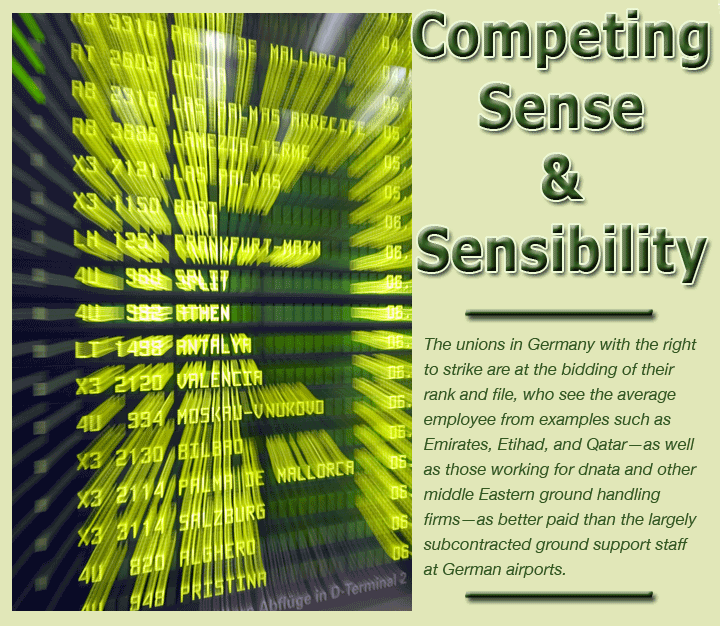Competing Sense
& Sensibility

A recent study from Handelsblatt Research
Institute titled “Factors of Competitiveness for the International
Air Transport Sector” appeared as a coordinated effort to present
a unified front. It came with the endorsement of most major German transport
companies.
Taken at arms length, “Factors of
Competitiveness” might have been a comprehensive state of the industry
report with an unbiased view on the shortcomings and strengths of the
industry in Germany.
But rather than breaking new ground, the
report actually rehashes and repeats some well-worn charges and counter
charges detailing the difficulties German transport faces today while
operating in an open, free market.
Tell Us Something
We Don’t Know
“Competitiveness” gets right
down to the business of waving the flag at onset, as the report reminds
that a “competitive and effective air transport sector is a prerequisite
for an export-oriented economy such as Germany and a strategically important
local factor.”
No one will disagree with that statement,
although one doesn’t need to be a rocket scientist to come to this
conclusion.
No surprise either, as the well-worn charge
resurfaces—albeit now as a chorus—in this stakeholders report
that German transport players are burdened by “unfair competition
from Asian and Middle Eastern operators.”
Emirates, Etihad, and Qatar are enjoined
in “Competitiveness’” together with the booming Turkish
Airlines, as competitors who receive the main share of blame for the trials
and tribulations of German transport.
A Closer
Look
Nowhere in this report is it discussed that the
rights enjoyed by international carriers in Germany to land and do business
are a homemade condition driven by overregulation in some sectors and
total lack of regulation in others.
Also overlooked and not covered at all in
this report are the ongoing and apparently unresolved issues with the
800-pound gorilla in the form of German Labor unions—which incidentally
came to the center of aviation earlier in April, as VERDI, one of the
largest German organized labor groups representing the service sector
(thus including many of the airport ground support personnel such as baggage
handlers, check-in staff, and mechanics), went on strike—shut down
the seven largest German airports that brought operations at FRA, almost
to a standstill.
The work stoppage then was just the latest
chapter in an ongoing dispute that threatens to interrupt transport in
and out and across Germany in the months and years ahead, time and time
again.
For example, on February 21st the security
screeners performed a strike, stranding over 13,000 passengers in Frankfurt
alone.
Lufthansa management reasons that a German
flag carrier is indispensable for the German economy and that a German
banker should not have to hub in CDG, LHR, SPL, or BRU.
But today the hard numbers say that a considerable
number of frequent travelers are avoiding German airlines (and German
airports altogether, when possible) for fear of getting stranded.
In addition, the air passenger tax, levied
by the German government on all tickets originating in Germany, has driven
a considerable number of passengers to French, Swiss, Dutch, and Czech
gateways as well.
But the unions in Germany with the right
to strike are at the bidding of their rank and file, who see the average
employee from examples such as Emirates, Etihad, and Qatar—as well
as those working for dnata and other middle Eastern ground handling firms—as
better paid than the largely subcontracted ground support staff at German
airports.
Perhaps even worse is a widely held perception
here that in terms of qualification, training, and professional development,
these “foreign flag” carriers have taken the lead.
Reverse Slap
Shot From Turkish
Germany can also look at booming Turkish Airways,
which owes some portion of its success to the unwillingness of “big
brother,” the EC, to admit Turkey—one of the few dynamic economies
with a young and well educated workforce—as a full member.
Turkey frozen out as a member of the EC
means, for example, that Turkish Airways can operate without needing to
adhere to the draconian ETS rules and other EC edicts whose merit must
be called into question.
Of course, this is just one factor of many.
Another factor is the night curfews (Germany’s largest airport,
FRA, cannot operate between 11pm and 5am), which cannot support salaries
that, though high when compared to those in Asia, can barely provide for
a family in Germany.
German weekly DER SPIEGEL
quoted a VERDI union worker as saying: “With 1,600 Euros (2,200
US$) net and two kids, I can’t fly anywhere anyway.”
We all hope for better.
Jens
|






